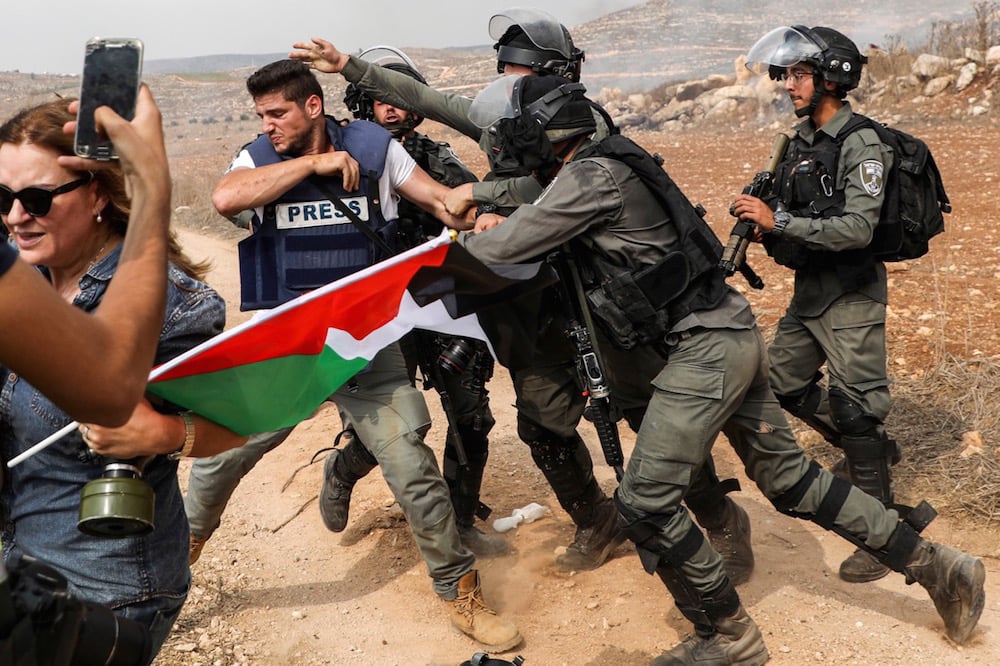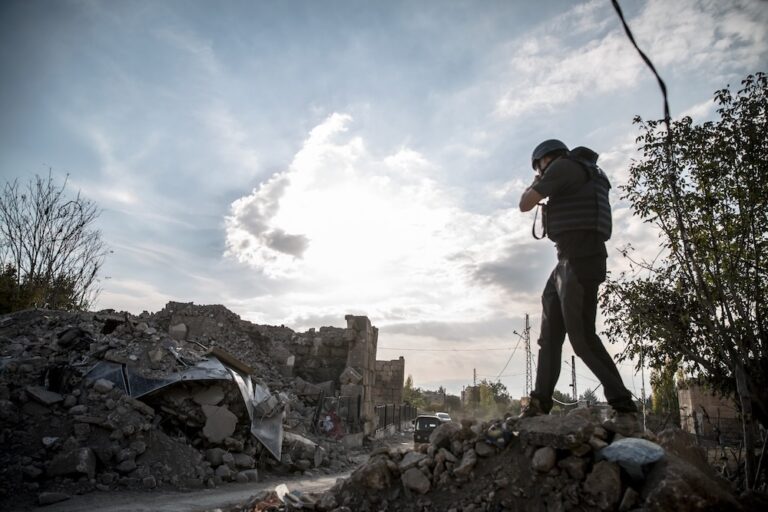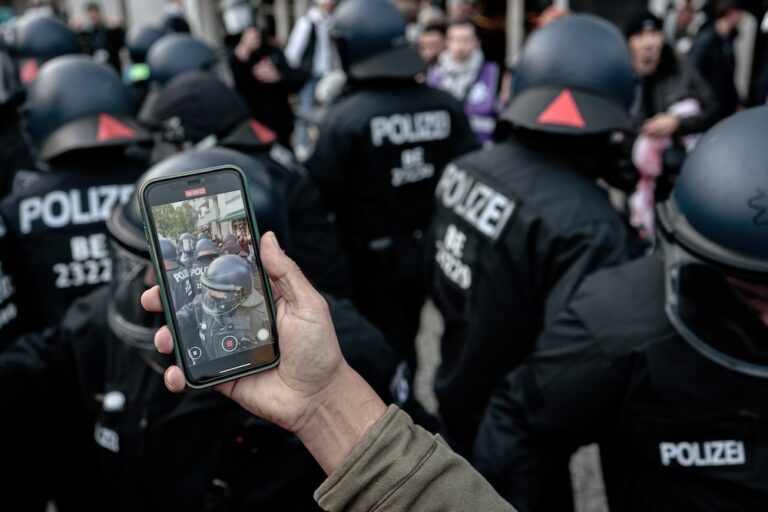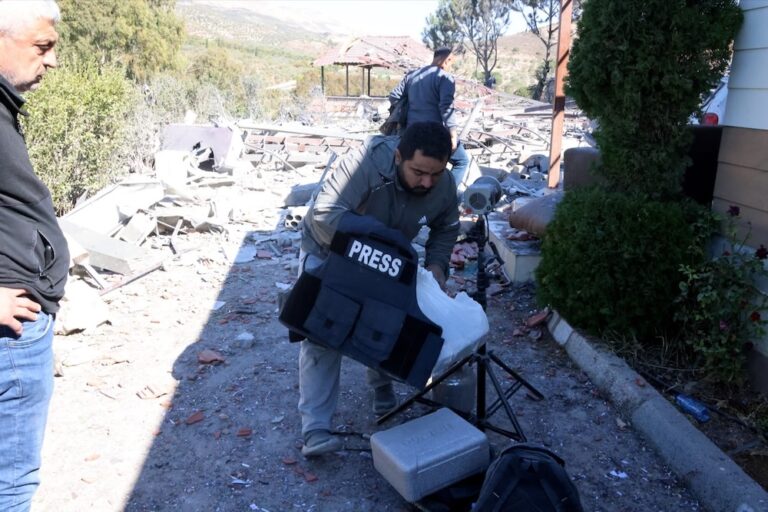Palestinian journalists and media faced a growing number of violations against them in 2019 according to an annual report from The Palestinian Center for Development and Media Freedoms (MADA).
This statement was originally published on madacenter.org on 11 February 2020.
The Palestinian Center for Development and Media Freedoms “MADA” issued its annual report on media freedoms in Palestine during the past year 2019. It is worth mentioning that this report is part of the project “A Step Forward towards Promoting Freedom of Expression in Palestine”, supported by the European Union.
The report was released during a press conference held today on Watan TV, with the participation of Dr. Ghazi Hanania, Chairman of the Board of Directors of MADA Center, Mr. Mousa Rimawi, Director General of the Center, and journalists Moath Amarneh and Christine Renawi.
Media Freedom Report 2019: Results Summary
The report indicates that the year 2019 did not bring any concrete positive changes in terms of respecting media freedoms and putting an end to attacks against journalists and media outlets. The Israeli occupation forces and authorities continued, at great frequency, to commit various types of attacks against Palestinian journalists, especially physical attacks. Also, social media companies and networks have become one the actors that suppress media freedoms and fight Palestinian content, according to the vision and standards of the Israeli occupation state. This all started in 2016 when Facebook started to implement agreements and understandings with the Israeli occupation state.
According to the report, during 2019 MADA Center monitored and documented a total of 678 violations against media freedoms in the West Bank and Gaza Strip (including occupied Jerusalem). This number constitutes a total increase of 94 points (16%) over the total number of violations recorded in the year before (2018), noting that this rise came mainly as a result of violations committed by the social media companies (Facebook specifically).
The Israeli occupation forces and authorities committed during 2019 a total of 297 attacks (about 44% of all attacks), while social media companies committed 181 violations (27%), and various Palestinian authorities in the West Bank and Gaza Strip committed a total of 200 violations (29% of all recorded violations). These attacks affected a total of 503 journalists, including 456 male journalists and 47 female journalists in the West Bank and Gaza Strip.
The annual report of MADA indicates that ten years ago Palestinian journalists and media were subjected to an average of 18 attacks per month. This gradually increased and in the year 2019 there was an average of 56.5 attacks every month, meaning that Palestinian journalists and media outlets are exposed to an average of one assault every 12.7 hours.
Israeli Violations
The report shows that the number of violations by the Israeli occupation underwent a significant decrease in 2019 (about 35%) compared to the previous year. However, this decline did not reflect an improvement in respecting press freedom in Palestine by the Israeli occupation, but rather it was a result of limited events and confrontations in the field with the occupation forces. Israeli violations against Palestinian journalists and media increased in terms of the use of violence, and a detailed look at the quality of the Israeli attacks reveals this fact. For instance, the percentage of physical attacks (for example) out of the total recorded Israeli attacks increased compared to what they were in the past and constituted 54% of the total Israeli attacks.
There were 11 types of Israeli attacks, five of which are considered the most dangerous to the lives of journalists and media freedom, namely: physical attacks, the arrest or detention of journalists, the confiscation, detention, or destruction of work equipment, the use of some journalists as human shields while working in the field, and the closure or destruction of media organizations. It should be mentioned that the five of the most dangerous types of attacks made up 72% of all Israeli attacks recorded in 2019.
MADA Center indicates in its annual report that severe violence, and direct and deliberate targeting have become the first choice for the Israeli occupation forces and authorities in their daily engagement with journalists and media outlets, in order to exclude them from the fields of work. Among the total number of physical injuries resulting from 159 attacks committed by the Israeli occupation forces against journalists during 2019, 94 of these journalists and victims were wounded by live bullets, metal and rubber bullets, and with direct gas bombs. Dozens of them were severely injured, as was the case of journalist Moath Amarneh, who lost his left eye as a result of a live bullet fired at him while he was covering a peaceful popular protest at Surif in Hebron.
Moreover, the number of journalists who were hit by direct gas bombs fired by the Israeli soldiers reached 42; 18 of them were injured in the sensitive upper parts of their body (nine of these suffered injuries in the head and face and the other nine were injured in the neck, chest, or back).
Violations by Social Media Companies
The year 2019 witnessed the entry of Facebook as a major violator of media freedom in Palestine, due to the understandings between the Israeli government and Facebook in 2016, under the pretext of fighting “incitement.”
During 2019, MADA monitored and documented a total of 181 violations committed by social media companies and networks (180 of which were committed by Facebook and WhatsApp), which constitutes 27% of the total violations. This number is equal to the total number of violations committed by Palestinian authorities in each of the West Bank and Gaza Strip combined, which constituted about 29%.
These violations included the closing down by Facebook of news pages (belonging to various media outlets), and others belonging to Palestinian journalists, or blocking them for specific periods, or deleting content published on them, or preventing the admins of these pages to post on Facebook. These attacks did not only affect journalists, but hundreds of other Palestinian citizens who were also blocked by Facebook.
MADA Center explained in its annual report that Facebook behaves in a unidirectional way, and limits its movement to what Israel considers Palestinian “incitement” content. On the other hand, Facebook ignores the huge amount of Israeli hate speech and incitement against Palestinians. It should be noted that Facebook stated in its Transparency Report that it received during the year 2018 a total of 1321 Israeli requests regarding the closure and blocking of websites and that it “dealt” with about 72% of them – while in the first half of 2019, it received a total of 709 Israeli requests and reportedly “dealt with 76% of them”.
Palestinian Violations
The number of Palestinian violations recorded in the West Bank and Gaza Strip during the year 2019 underwent a remarkable increase, as the result of a strong increase recorded in the Gaza Strip compared to what had occurred in 2018.
MADA Center monitored and documented during the year 2019 a total of 200 violations committed by Palestinian authorities in the West Bank and Gaza, which represents a 55% increase from what was recorded in the year 2018, with 129 Palestinian violations, knowing that this increase was recorded exclusively in Gaza Strip.
These violations were divided into 87 violations that occurred in the West Bank (a number similar to what was recorded in the West Bank in 2018, which witnessed 88 violations), and 113 Palestinian violations that occurred in 2019 in Gaza, which represents an increase of almost 276% over the previous year, where 41 violations were recorded.
Additionally, the report explains how the government of Dr. Muhammad Shtayyah has created a positive atmosphere regarding media freedom in Palestine, and has demonstrated a clear commitment to that. The number of violations recorded in the West Bank were almost zero over the months following the inauguration in April 2019, but this all changed when the Ramallah Magistrate Court (on October 17 2019) issued a decision to close a total of 49 news websites and Facebook pages, dispelling the positive atmosphere spread by the Shtayyah government, and reviving fears in this regard echoing the previous era.
Among the most prominent Palestinian violations that were recorded in 2019, in addition to the closure of dozens of websites, were a total of 46 cases of arrest and detention carried out by Palestinian authorities. 15 of these violations were committed in the West Bank and 31 in Gaza Strip. Most cases of arrest took place in Gaza (18 cases) and they were accompanied by severe physical torture, knowing that a single case of torture was registered in the West Bank.



